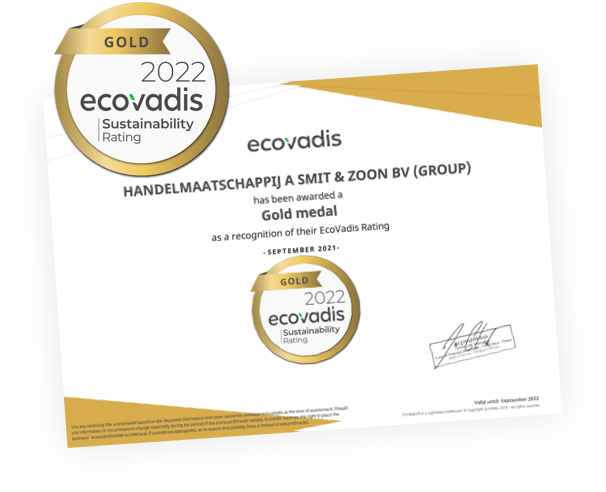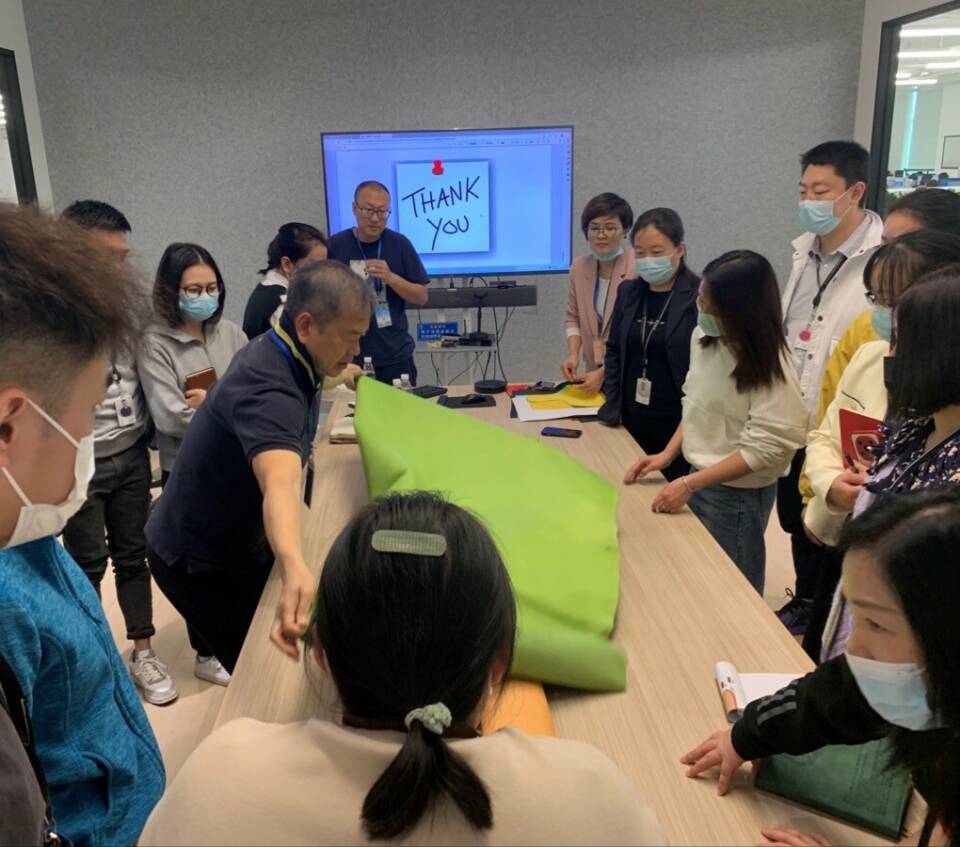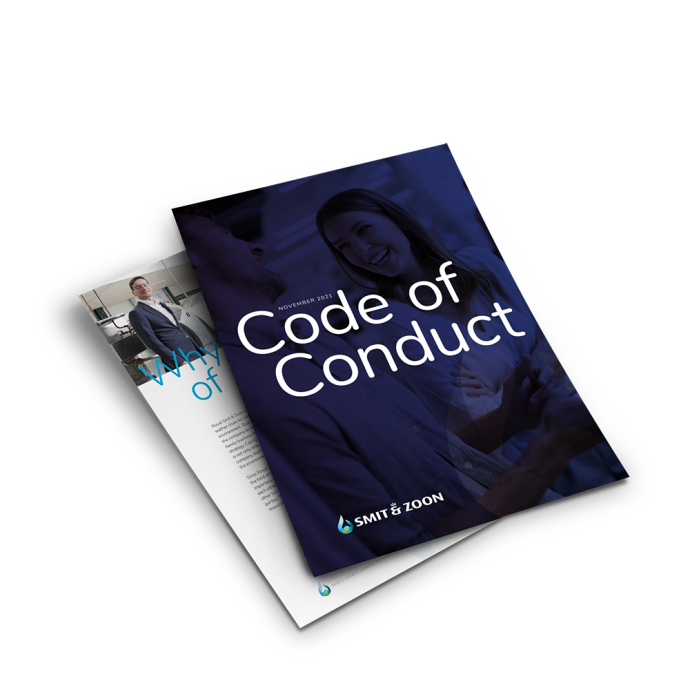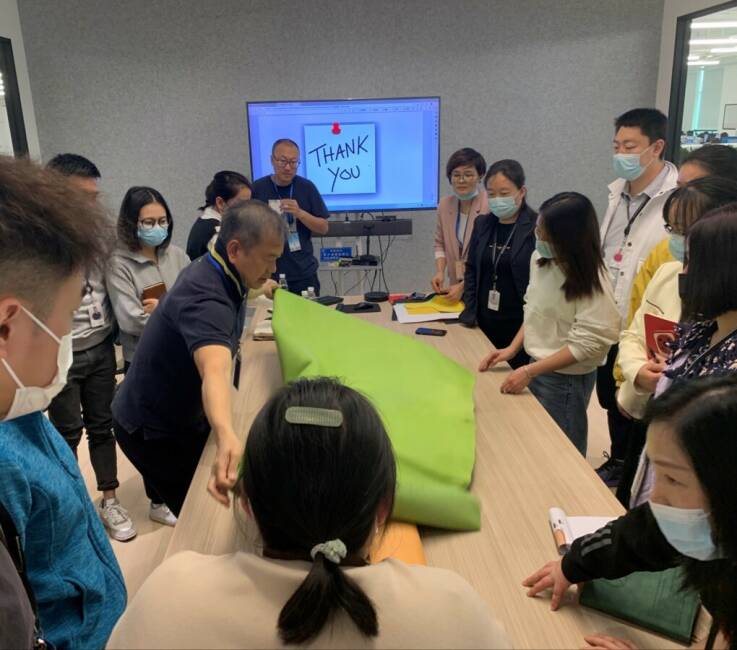For Royal Smit & Zoon, it’s important that everything we do is built on a strong foundation. Here we describe our commitments towards Governance, focusing on our 2025 ESG Roadmap commitments.
Achievements
Governance
All incentive programs include ESG targets
In the past, specific job holders, as well as key management positions, already had ESG targets in their incentive programs. We believe personal ESG targets are instrumental in steering for continuous improvement of our ESG impact. It supports our employees to integrate our Guiding Principles in their daily work and to align their actions with supporting our mission of ‘creating a socially and environmentally sustainable leather value chain together’.
Based on the 2025 ESG Roadmap, this KPI was defined for the first year in 2022. For 42% of the specific job holders with an incentive program, the 2022 personal goals included an ESG target. The largest gap in ESG target setting concerned our technical sales employees. For 75% of key management positions, including all board of management direct reports (Global Leadership Team and Global Commercial Team), the 2022 personal goals included an ESG target. Most of the gap versus 100% was caused by new hires and role changes in this group during the year.
In general, the 2022 ESG targets that were internally oriented were mostly achieved. Those targeted at the value chain (suppliers, customers) proved more challenging to achieve. This was due to the challenging economic situation, Covid-19 travel limitations, and the Covid-19 lockdown in China, all impacting customer interaction (particularly for our technical sales employees) and priorities in our daily work.
For 2023, more specific job holders will be engaged with ESG targets. The (newly hired) key management positions are now steady in place, which will be self-corrective for the inclusion of ESG targets. Therefore, we expect to achieve a 100% ESG target setting for those positions in 2023. This should ultimately lead to all of our employees with incentive programs having an ESG target included in their personal goals.

Royal Smit & Zoon started to collaborate with EcoVadis in 2015. The Ecovadis rating methodology includes an evidence-based assessment of a company's non-financial management systems through reviewing policies, actions and results. Until 2020, we were accredited with the Ecovadis SILVER rating.
In 2021, Ecovadis accredited us with a GOLD rating that we proudly maintained in 2022. With this recognition, Royal Smit & Zoon belongs to the top 9% of companies assessed by EcoVadis.
The EcoVadis sustainability assessments focus on 21 issues which are grouped into 4 areas of key impacts (Environment, Labor & Human Rights, Ethics, and Sustainable Procurement). The 21 issues or criteria are based upon international sustainable development standards such as the Global Compact Principles, the International Labour Organization (ILO) conventions, the Global Reporting Initiative (GRI) standard, and the ISO 26000 standards. The benchmarking opportunities will guide us for ongoing improvements in the future.
EcoVadis Gold rating rewards our ESG leadership


Our Business Partner Code of Conduct is already in place since 2018 and is part of our Sales Partner Agreements. In 2021, we started piloting the Sales Partner Program with a selection of our agents. The purpose of this program is to ensure that our Sales Partners will understand and be ready to face the standards and requirements in ESG that Royal Smit & Zoon and the leather value chain are setting. Covid-19 travel limitations and the lockdown in China made the continuation and implementation of the pilot program very challenging.
Because of the Company’s mission to play a positive and pivotal role within the leather value chain, collaboration with our Sales Partners on ESG standards and requirements is a priority. Working hand in hand with our Sales Partners inevitably involves addressing a wide range of economic, environmental, and social impacts, working with industry standards, and meeting (upcoming) laws and regulations. To ensure we keep pace with the evolving ESG Landscape and continue to drive progress and transformative action across the entire leather value chain, we will redefine and relaunch our Sales Partner Program in 2023.
Sales agents & distributors are involved in our Sales Partner Program

responsibly mined and processed bauxite/aluminum. An ingredient of our Nera-tanning product Zeology is produced from alumina trihydrate (ATH), of which the raw material is mined bauxite. As a result of good collaboration across the value chain, the bauxite/ATH/aluminum used for Zeology has been certified according to well-known and reputable ESG industry standards.
Another example is our partnership with our customer and downstream Business Partner Lhasa Leather factory, a state-owned tannery enterprise in Tibet that produces leather from local hides into the brand YAK. About 400,000 farmers and herdsmen in the region benefit, providing socio-economic development to the ethnic minorities in this region. Lhasa Leather Factory and Royal Smit & Zoon have partnered on a technical collaboration on using the chromium-free, aldehyde-free, and heavy-metal-free tanning agent Zeology. This partnership ensures an upgrade and optimization of the leather production process with significantly less environmental impact. Heavy metals and pollutants from wastewater can be recovered with minimal energy consumption, and solid waste from production is compostable. At the same time, the yak leather products can be sold as recyclable and can technically be treated to turn into an eco-fertilizer (in an eco-friendly way) in 2 months. Zeology-tanned YAK leather is the lowest carbon-intensity leather in China.
We only work with strategic suppliers who consider sustainability to be a vital part of the way they conduct business. Our Business Partner Code of Conduct (BPCoC) is already in place since 2018. All of our suppliers are expected to work according to our BPCoC, which requires them to respect human and labor rights, responsibly use the environment and natural resources, and comply with all applicable legislation, regulations, and ethical standards. The principles and standards included in this document reflect those established in our own ESG Policy and Code of Conduct for employees. By asking our Business Partners to commit to the same principles and standards that guide our business, we facilitate a stronger and uniform commitment to creating a sustainable leather value chain. Since 2018, the BPCoC has been introduced with our key suppliers8 and targets have been set to ensure that all our suppliers will explicitly commit to it in 2025. At the same time, our continuous improvement approach drives us to carefully reflect on expected supply chain diligence legislation and our current requirements and approach for Business Partners regarding ESG.
Our vast belief in the ‘Power of Partnerships’ also means we partner with our first-tier suppliers (upstream) and Business Partners downstream. Working on a basis of respect and mutual trust while advancing on diversity, such collaborations drive continuous improvement in responsible business practices and create a real positive impact in making the leather value chain more sustainable, both upstream and downstream.
For example, in 2022, we partnered with a first-tier supplier on a responsible sourcing issue brought up by a customer demanding compliance with the new German Supply Chain Due Diligence Act (SCDDA), ensuring
Our key suppliers commit to our Business Partner Code of Conduct


7. This only concerns suppliers related to Dutch entity. Key suppliers have an annual spend of over Euro 200K and cover 80% of the top spend.
8. Related to the Dutch entity.
In 2021, the Employee Code of Conduct (ECoC) was formalized for the Netherlands and introduced in the Dutch entities of Royal Smit & Zoon. Our ECoC defines what a responsible way of working is for our employees, based on and according to our Guiding Principles. Ethical behavior, including the non-acceptance of bribery or any other form of corruption, is a critical element. With our Human Resources Department in the lead, a multi-year Training Program was defined in the Dutch entities. Creating awareness is a crucial first step for ethical behavior and compliant operations.
Our Employee Code of Conduct (ECoC) guides our day-to-day business


- As a result, 100% of our employees of the Dutch entities confirmed they have ‘read & understood’ the ECoC.
In November, the first step of the multi-year training program was executed. Prevention of corruption and bribery is one of the repetitive key topics we will address each year. Through online training, we created awareness and a basic understanding of the content of the ECoC in practice. Almost 100% of our employees participated in the 2022 training.
For 2022, the internal training program included:
- The policy was embedded into our internal document and quality management system called Manual Master. We asked all employees in the Dutch group entities, including all new hires during the year, representing 44% of our total employees in Smit Group, to confirm in the system they have ‘read and understood’ the ECoC.
- The ECoC was included in the onboarding program, so all new hires in the Dutch group entities signed for the receipt of the policy. During 2022, these new hires were also asked to confirm they had ‘read and understood’ the document.
Our ECoC also includes the opportunity to report on suspected unlawful and inappropriate behavior, supported by our Whistle Blower Policy and Procedure for reporting cases of inappropriate behavior or unsafe working conditions. In 2022, there were seven cases reported, all investigated and closed. To ensure our ECoC supports a responsible way of working for all our employees, our HR department discusses annually with our designated Whistle Blower Officer and Confidential Counselor which behavioral topics need priority during our training.
During 2022, a global ECoC version was drafted in cooperation with our entities in Italy, India, China, and Germany. The global ECoC is aligned with the ECoC of our Dutch entities, taking local customs - if possible - into account for full acceptance. The global ECoC will be formalized and approved by the Board of Management at the beginning of 2023, followed by a kick-off event within all foreign group entities. A roll-out of a global multi-year training program has been scheduled. The first part of this training program will also focus on creating (more) awareness, similar to the employees in the Dutch entities.
Consistent with our Guiding Principles, diversity and inclusion is at the heart of our Company. Our ESG Policy and ECoC express our commitment to diversity and non-discrimination and define the expected responsible way of working. As one of our five Guiding Principles, diversity and inclusion also belong to the repetitive key topics that we will address each year in our multi-year training program on the Employee Code of Conduct. For the Dutch Entity, we implemented the Guiding Principles in our HR performance management system. As such, employees are asked to consider how they integrate diversity and inclusion into their daily work.
Our global workforce consists of 73% male and 27% female employees, all of 22 different nationalities and a wide variety of ages. As for gender equality, 30% of our Global Leadership Team are women, reflecting near to gender equality in top management positions. Diversity refers to the variety of differences between individuals and encompasses much more than age, gender, and nationality. For a chemical company like ours, it is a crucial driver for sparking innovation and bringing different perspectives together to refine an idea. We believe that having a diverse workplace where the voice and contribution of each individual are valued and recognized only adds to overall business success.
Diversity & Inclusion

To be a company that customers and society consistently trust, we have a comprehensive approach of policies, risk assessments, technical and non-technical measures and procedures, and employee training in place to mitigate any information security risks that may arise. Information security, including data privacy, is a critical element in our ESG Policy and Employee Code of Conduct (ECoC). Beyond these overarching company policies, we have a specific Cyber Security Policy, Information Security (ICT) Policy, and Incident Management Policy in place. Annually, Cyber Security Risk assessments are performed by an external party, and its findings are reported and accurately acted on to facilitate a continuous improvement cycle. A vulnerability scan, hacking, and social engineering tests are planned for 2023, with findings to be acted on. Incident Response and Business Continuity Plans, with accompanying monitoring and control procedures, are in place to act immediately when - despite our Policies and Procedures - incidents occur. In 2022, Royal Smit & Zoon had no reportable incidents of information and/or cyber security breaches. Our employees must participate in mandatory online training modules throughout the year, equipping them to prevent and promptly trace potential information security threats and adequately act and report on incidents. Except for China, the number of training hours on information security received per employee in 2022 was 15. In 2023, the online training program will be extended to our employees in China.
Information Security

UN SDG goals
We addressed a series of Materiality Matrix topics, including Occupational Health & Safety, Training & Education, Environmental Compliance, Customer Health & Safety, Economic Performance, and Anti-Corruption.


To be a company that customers and society consistently trust, we have a comprehensive approach of policies, risk assessments, technical and non-technical measures and procedures, and employee training in place to mitigate any information security risks that may arise. Information security, including data privacy, is a critical element in our ESG Policy and Employee Code of Conduct (ECoC). Beyond these overarching company policies, we have a specific Cyber Security Policy, Information Security (ICT) Policy, and Incident Management Policy in place. Annually, Cyber Security Risk assessments are performed by an external party, and its findings are reported and accurately acted on to facilitate a continuous improvement cycle. A vulnerability scan, hacking, and social engineering tests are planned for 2023, with findings to be acted on. Incident Response and Business Continuity Plans, with accompanying monitoring and control procedures, are in place to act immediately when - despite our Policies and Procedures - incidents occur. In 2022, Royal Smit & Zoon had no reportable incidents of information and/or cyber security breaches. Our employees must participate in mandatory online training modules throughout the year, equipping them to prevent and promptly trace potential information security threats and adequately act and report on incidents. Except for China, the number of training hours on information security received per employee in 2022 was 15. In 2023, the online training program will be extended to our employees in China.
Information Security

Consistent with our Guiding Principles, diversity and inclusion is at the heart of our Company. Our ESG Policy and ECoC express our commitment to diversity and non-discrimination and define the expected responsible way of working. As one of our five Guiding Principles, diversity and inclusion also belong to the repetitive key topics that we will address each year in our multi-year training program on the Employee Code of Conduct. For the Dutch Entity, we implemented the Guiding Principles in our HR performance management system. As such, employees are asked to consider how they integrate diversity and inclusion into their daily work.
Our global workforce consists of 73% male and 27% female employees, all of 22 different nationalities and a wide variety of ages. As for gender equality, 30% of our Global Leadership Team are women, reflecting near to gender equality in top management positions. Diversity refers to the variety of differences between individuals and encompasses much more than age, gender, and nationality. For a chemical company like ours, it is a crucial driver for sparking innovation and bringing different perspectives together to refine an idea. We believe that having a diverse workplace where the voice and contribution of each individual are valued and recognized only adds to overall business success.
Diversity & Inclusion

Our ECoC also includes the opportunity to report on suspected unlawful and inappropriate behavior, supported by our Whistle Blower Policy and Procedure for reporting cases of inappropriate behavior or unsafe working conditions. In 2022, there were seven cases reported, all investigated and closed. To ensure our ECoC supports a responsible way of working for all our employees, our HR department discusses annually with our designated Whistle Blower Officer and Confidential Counselor which behavioral topics need priority during our training.
During 2022, a global ECoC version was drafted in cooperation with our entities in Italy, India, China, and Germany. The global ECoC is aligned with the ECoC of our Dutch entities, taking local customs - if possible - into account for full acceptance. The global ECoC will be formalized and approved by the Board of Management at the beginning of 2023, followed by a kick-off event within all foreign group entities. A roll-out of a global multi-year training program has been scheduled. The first part of this training program will also focus on creating (more) awareness, similar to the employees in the Dutch entities.
- As a result, 100% of our employees of the Dutch entities confirmed they have ‘read & understood’ the ECoC.
In November, the first step of the multi-year training program was executed. Prevention of corruption and bribery is one of the repetitive key topics we will address each year. Through online training, we created awareness and a basic understanding of the content of the ECoC in practice. Almost 100% of our employees participated in the 2022 training.
For 2022, the internal training program included:
- The policy was embedded into our internal document and quality management system called Manual Master. We asked all employees in the Dutch group entities, including all new hires during the year, representing 44% of our total employees in Smit Group, to confirm in the system they have ‘read and understood’ the ECoC.
- The ECoC was included in the onboarding program, so all new hires in the Dutch group entities signed for the receipt of the policy. During 2022, these new hires were also asked to confirm they had ‘read and understood’ the document.

UN SDG goals
We addressed a series of Materiality Matrix topics, including Occupational Health & Safety, Training & Education, Environmental Compliance, Customer Health & Safety, Economic Performance, and Anti-Corruption.


Please swipe to view full table
In 2021, the Employee Code of Conduct (ECoC) was formalized for the Netherlands and introduced in the Dutch entities of Royal Smit & Zoon. Our ECoC defines what a responsible way of working is for our employees, based on and according to our Guiding Principles. Ethical behavior, including the non-acceptance of bribery or any other form of corruption, is a critical element. With our Human Resources Department in the lead, a multi-year Training Program was defined in the Dutch entities. Creating awareness is a crucial first step for ethical behavior and compliant operations.
Our Employee Code of Conduct (ECoC) guides our day-to-day business

7. This only concerns suppliers related to Dutch entity. Key suppliers have an annual spend of over Euro 200K and cover 80% of the top spend.
8. Related to the Dutch entity.

Please swipe to view full table
We only work with strategic suppliers who consider sustainability to be a vital part of the way they conduct business. Our Business Partner Code of Conduct (BPCoC) is already in place since 2018. All of our suppliers are expected to work according to our BPCoC, which requires them to respect human and labor rights, responsibly use the environment and natural resources, and comply with all applicable legislation, regulations, and ethical standards. The principles and standards included in this document reflect those established in our own ESG Policy and Code of Conduct for employees. By asking our Business Partners to commit to the same principles and standards that guide our business, we facilitate a stronger and uniform commitment to creating a sustainable leather value chain. Since 2018, the BPCoC has been introduced with our key suppliers8 and targets have been set to ensure that all our suppliers will explicitly commit to it in 2025. At the same time, our continuous improvement approach drives us to carefully reflect on expected supply chain diligence legislation and our current requirements and approach for Business Partners regarding ESG.
Our vast belief in the ‘Power of Partnerships’ also means we partner with our first-tier suppliers (upstream) and Business Partners downstream. Working on a basis of respect and mutual trust while advancing on diversity, such collaborations drive continuous improvement in responsible business practices and create a real positive impact in making the leather value chain more sustainable, both upstream and downstream.
For example, in 2022, we partnered with a first-tier supplier on a responsible sourcing issue brought up by a customer demanding compliance with the new German Supply Chain Due Diligence Act (SCDDA), ensuring responsibly mined and processed bauxite/aluminum. An ingredient of our Nera-tanning product Zeology is produced from alumina trihydrate (ATH), of which the raw material is mined bauxite. As a result of good collaboration across the value chain, the bauxite/ATH/aluminum used for Zeology has been certified according to well-known and reputable ESG industry standards.
Another example is our partnership with our customer and downstream Business Partner Lhasa Leather factory, a state-owned tannery enterprise in Tibet that produces leather from local hides into the brand YAK. About 400,000 farmers and herdsmen in the region benefit, providing socio-economic development to the ethnic minorities in this region. Lhasa Leather Factory and Royal Smit & Zoon have partnered on a technical collaboration on using the chromium-free, aldehyde-free, and heavy-metal-free tanning agent Zeology. This partnership ensures an upgrade and optimization of the leather production process with significantly less environmental impact. Heavy metals and pollutants from wastewater can be recovered with minimal energy consumption, and solid waste from production is compostable. At the same time, the yak leather products can be sold as recyclable and can technically be treated to turn into an eco-fertilizer (in an eco-friendly way) in 2 months. Zeology-tanned YAK leather is the lowest carbon-intensity leather in China.
Our key suppliers commit to our Business Partner Code of Conduct

Please swipe to view full table
Our Business Partner Code of Conduct is already in place since 2018 and is part of our Sales Partner Agreements. In 2021, we started piloting the Sales Partner Program with a selection of our agents. The purpose of this program is to ensure that our Sales Partners will understand and be ready to face the standards and requirements in ESG that Royal Smit & Zoon and the leather value chain are setting. Covid-19 travel limitations and the lockdown in China made the continuation and implementation of the pilot program very challenging.
Because of the Company’s mission to play a positive and pivotal role within the leather value chain, collaboration with our Sales Partners on ESG standards and requirements is a priority. Working hand in hand with our Sales Partners inevitably involves addressing a wide range of economic, environmental, and social impacts, working with industry standards, and meeting (upcoming) laws and regulations. To ensure we keep pace with the evolving ESG Landscape and continue to drive progress and transformative action across the entire leather value chain, we will redefine and relaunch our Sales Partner Program in 2023.
Sales agents & distributors are involved in our Sales Partner Program

Please swipe to view full table

Royal Smit & Zoon started to collaborate with EcoVadis in 2015. The Ecovadis rating methodology includes an evidence-based assessment of a company's non-financial management systems through reviewing policies, actions and results. Until 2020, we were accredited with the Ecovadis SILVER rating.
In 2021, Ecovadis accredited us with a GOLD rating that we proudly maintained in 2022. With this recognition, Royal Smit & Zoon belongs to the top 9% of companies assessed by EcoVadis.
The EcoVadis sustainability assessments focus on 21 issues which are grouped into 4 areas of key impacts (Environment, Labor & Human Rights, Ethics, and Sustainable Procurement). The 21 issues or criteria are based upon international sustainable development standards such as the Global Compact Principles, the International Labour Organization (ILO) conventions, the Global Reporting Initiative (GRI) standard, and the ISO 26000 standards. The benchmarking opportunities will guide us for ongoing improvements in the future.
EcoVadis Gold rating rewards our ESG leadership

Please swipe to view full table
All incentive programs include ESG targets
In the past, specific job holders, as well as key management positions, already had ESG targets in their incentive programs. We believe personal ESG targets are instrumental in steering for continuous improvement of our ESG impact. It supports our employees to integrate our Guiding Principles in their daily work and to align their actions with supporting our mission of ‘creating a socially and environmentally sustainable leather value chain together’.
Based on the 2025 ESG Roadmap, this KPI was defined for the first year in 2022. For 42% of the specific job holders with an incentive program, the 2022 personal goals included an ESG target. The largest gap in ESG target setting concerned our technical sales employees. For 75% of key management positions, including all board of management direct reports (Global Leadership Team and Global Commercial Team), the 2022 personal goals included an ESG target. Most of the gap versus 100% was caused by new hires and role changes in this group during the year.
In general, the 2022 ESG targets that were internally oriented were mostly achieved. Those targeted at the value chain (suppliers, customers) proved more challenging to achieve. This was due to the challenging economic situation, Covid-19 travel limitations, and the Covid-19 lockdown in China, all impacting customer interaction (particularly for our technical sales employees) and priorities in our daily work.
For 2023, more specific job holders will be engaged with ESG targets. The (newly hired) key management positions are now steady in place, which will be self-corrective for the inclusion of ESG targets. Therefore, we expect to achieve a 100% ESG target setting for those positions in 2023. This should ultimately lead to all of our employees with incentive programs having an ESG target included in their personal goals.
For Royal Smit & Zoon, it’s important that everything we do is built on a strong foundation. Here we describe our commitments towards Governance, focusing on our 2025 ESG Roadmap commitments.
Achievements
Governance
